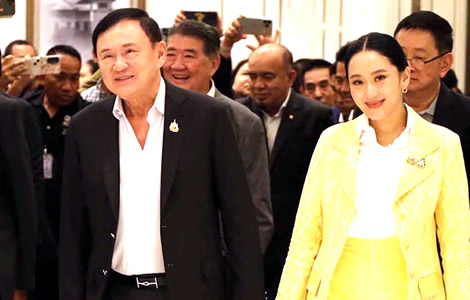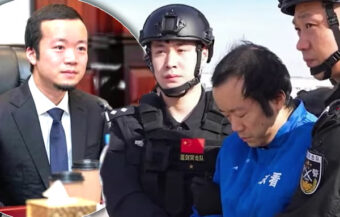Thaksin blames unregulated cannabis and a flawed charter for Thailand’s tourist slump and weak governance. At a high-profile coalition dinner, he called for urgent reform, unity and strong leadership—offering his 51 years of experience to guide the way.
Former Prime Minister Thaksin Shinawatra came out swinging Tuesday night, blaming Thailand’s cannabis free-for-all for driving tourists away and stalling the country’s post-COVID recovery. At a coalition dinner in Bangkok, the de facto Pheu Thai boss said the surge in drug-tolerant hotspots is scaring off foreign visitors and dragging down the nation’s rebound. Thaksin reminded party allies of his 51 years in politics—and made clear he’s still in the game. “Anyone who needs advice, just ask,” he said. “I’m here.” He took aim at the current constitution, calling it a blueprint for weak governments and fractured coalitions. In contrast, he hailed the 1997 charter for delivering strong leadership and unified parties. His message was clear: it’s time for focus, unity and political muscle if Thailand wants to regain its footing.

Former Prime Minister Thaksin Shinawatra was the dominant figure at Tuesday night’s coalition dinner. The event took place at the Eastin Grand Hotel Phayathai in Bangkok. It mainly aimed to bolster unity among coalition partners under the Pheu Thai-led government.
Thaksin’s presence drew widespread attention, despite ongoing legal issues. These include an upcoming lese-majeste ruling and scrutiny over his past VIP treatment in hospital detention. Nevertheless, he appeared composed and in control. He smiled broadly while greeting reporters.
Although he sidestepped questions about political dominance, Thaksin made his experience clear. In fact, in his speech, he reminded the audience he entered politics at 25. He now boasts 51 years of political involvement. He used that experience to draw comparisons between today’s politics and past decades.
Thaksin warns current constitution enables weak governments and calls 1997 charter best for stability
Notably, he focused on the country’s constitutions. He praised the 1997 Constitution repeatedly. It, he said, allowed for strong governments and party unity. Conversely, he criticised the 2006 and 2014 coups. These, he argued, weakened government stability.
According to Thaksin, the 2017 Constitution was crafted with him in mind. It was designed, in his words, to restrict decisive leadership. He framed this as an intentional effort to limit effective governance. His tone, while diplomatic, carried an undertone of frustration.
While avoiding direct confrontation, Thaksin clearly expressed dissatisfaction with current political structures. In his view, small and fragmented political parties lead to indecision.
Throughout the night, Thaksin’s influence was unmistakable. He addressed the ministers and MPs in a style both relaxed and commanding. He emphasised unity, urging the coalition to stand firm. “From now on, we will be serious,” he said.
Although officially ‘unemployed’, Thaksin made it clear he remains available. He offered advice and guidance to anyone willing to consult him. He encouraged MPs and ministers to reach out if they needed help.
Unregulated cannabis blamed for tourist decline as Thaksin urges action to restore Thailand’s image
In addition to politics, Thaksin addressed tourism issues. He pointed to a 5% drop in foreign arrivals. In his view, the cause is Thailand’s unregulated cannabis policy. Tourists, he claimed, dislike the country’s drug-tolerant image. This, he warned, deters visitors and harms local economies.
Therefore, he called for urgent regulation. Cannabis, he said, must be brought under control. Tourism recovery depends on it. According to Thaksin, other countries have already returned to 2019 levels. Thailand, however, lags behind.
The dinner drew many prominent attendees. Besides Thaksin and his daughter Paetongtarn Shinawatra, a range of high-ranking officials participated. These included Deputy PM Phumtham Wechayachai, Health Minister Somsak Thepsuthin, and Labour Minister Pongkawin Jungrungruangkit. Other ministers from education, finance, science, and transport also joined.
The event was lively and sociable. Coalition members from various parties mingled freely. Despite internal rivalries, the mood remained upbeat.
Paetongtarn addresses ethics probe while Thaksin recalls lessons from Thailand’s fragmented past
Paetongtarn, who is currently Culture Minister, also addressed the audience. She thanked everyone for their solidarity. She emphasised their shared mission—to serve the people.
Paetongtarn is currently awaiting a ruling from the Constitutional Court. The case involves her phone conversation with former Cambodian Prime Minister Hun Sen. Some critics see this as an ethics issue.
Still, she appeared confident and optimistic. She also confirmed her hope to return to the premiership if the suspension lifts.
Thaksin shared anecdotes from his early political years. He recalled helping Prida Pattanatabutr during the Kukrit Pramoj administration. He likened today’s coalition to the fragmented parties of that era.
Back then, he had to chase MPs to ensure quorum. Today, with seniority and influence, he operates differently. Meanwhile, “Some of you are like my children or grandchildren,” he joked.
Thaksin slams Bhumjaithai exit and urges loyalty to coalition in return for long-term political strength
He praised the 1997 Constitution for empowering parties. Later charters, he argued, diluted power and fueled instability.
He criticised the Bhumjaithai Party’s decision to exit the coalition. Though disappointed, he accepted it. “It was not a gentlemanly move,” he said. Still, he believes the coalition remains strong.
Thaksin shared a vision of collaboration and long-term loyalty. He suggested the coalition’s future depends on unity. “If we don’t abandon each other now, we won’t abandon each other forever,” he said.
In a personal touch, he reminisced about his wedding. It occurred just after parliament dissolved. Nearly all the guests were politicians. “There were 800 to 900 of them,” he said. This story highlighted his long-standing political ties.
Thaksin emphasised loyalty and perseverance. He stressed that challenges are opportunities. He encouraged ministers to give warmth to MPs. According to him, good internal relations prevent betrayal.
Ministers urged to show resolve as Thaksin warns of schemers and calls for rapid government action
He warned of bullies and schemers in today’s politics. Therefore, ministers must support one another. That way, he said, the government can stay strong.
He highlighted the role of the Ministry of Interior. He praised Minister Phumtham’s quick action, including transferring two directors-general. “We must be decisive,” he stressed. “No time for dancing in circles.”
He noted the government’s duty to act quickly. Technology, he said, helps solve problems faster. Nevertheless, cooperation and coordination remain essential. He called for better bureaucracy—transparent, responsive and people-centred.
Thaksin also brought up the nation’s worsening drug problem. He called drugs a serious threat to communities. He claimed many villagers suffer deeply. Economic hardships make the issue worse.
He urged for local rehabilitation centres in every district. Existing facilities like police dormitories could be repurposed. He said multiple ministries must work together. Only then can drug addiction be tackled quickly.
Cannabis reform and moral support dominate Thaksin’s final message as legal battle continues to loom
His tone was urgent but hopeful. Thaksin mentioned recent arrests as progress. But he warned that treatment lags behind.
He returned to tourism again. Cannabis, he said, remains a critical problem. Tourists are avoiding Thailand’s hotspots. Cannabis legalisation, in his view, scares off families and conservative travellers.
“We must restore control,” he declared. Ministries must regulate cannabis strictly. Public safety, he insisted, must come first.
He closed by offering moral support. He pledged to visit every province once legal issues are resolved. He welcomed any request for advice. He encouraged ministers and MPs to see him not just as a figurehead but a partner.
“You have me,” he said. “And Prime Minister Ung Ing. And her father.” The line drew laughs but underlined his message. He remains deeply involved, whether officially or not.
Thaksin asserts his authority through experience and signals continued influence despite no official role
Thaksin painted himself as an elder statesman. He combined nostalgia, wisdom and authority. His speech reinforced his informal leadership within the coalition.
Though no official position, his words carried weight. He set the tone for future unity. He called for patience, strength and discipline. And he made it clear: decisive, united action is the only path forward.
Cannabis or marijuana again going underground on November 11 2025, after minister’s order on Monday
Thaskin’s Udon Thani onslaught and attacks on ‘shitty laws’ is an open salvo in a battle with Bhumjaithai
Thaksin lifts morale of followers as US deal is in the works with a final rate close to that of Vietnam
With his 51 years of experience, Thaksin knows the system. He used that knowledge to inspire and caution. He reminded the coalition of its duty. Not just to each other—but to the nation.
While his critics remain vocal, Thaksin is not retreating. He is stepping forward, one careful sentence at a time. Whether officially or not, he remains the central figure in Thai politics.
Join the Thai News forum, follow Thai Examiner on Facebook here
Receive all our stories as they come out on Telegram here
Follow Thai Examiner here
Further reading:
Senate Committee Chair tells government to send Trump’s men packing and accept the 36% tariff rate


















